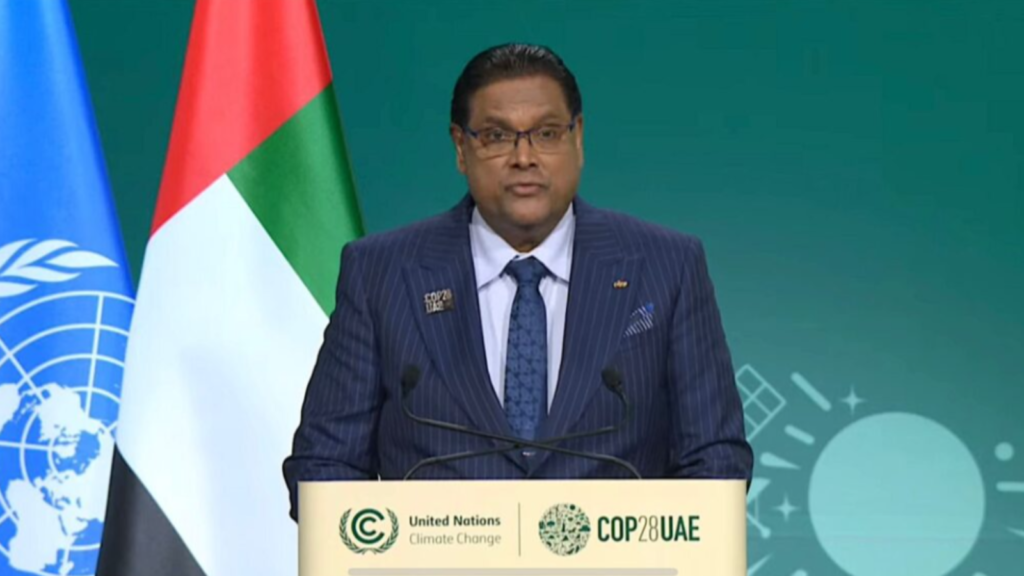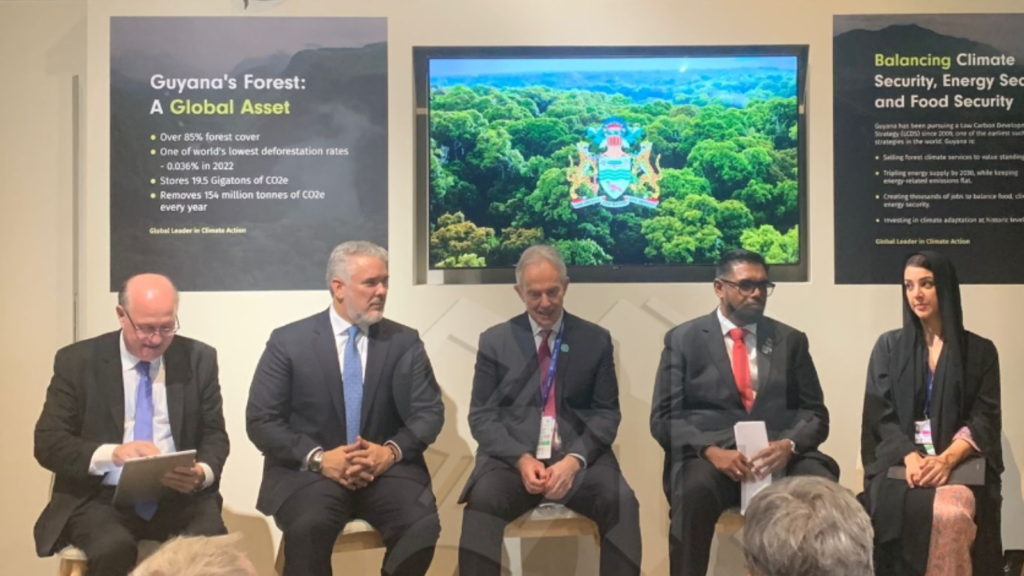“Let’s be very clear. Suriname will maintain its carbon negative status even when the offshore
oil and gas industry is developed.”
This was emphasised by President Chan Santokhi during his speech at the High-Level Segment of the 28th Conference of the Parties (COP) in Dubai. Santokhi stated that Suriname is trying to stimulate economic growth by developing its natural resources. According to the president, this is done through environmentally friendly strategies, sustainable forest management, protection of biodiversity and stimulation of the transition to green energy. The president maintains that the operation of the offshore oil and gas industry will also be based on these principles.
Oil and gas exploitation controversy in Suriname and Guyana
President Santokhi’s statement follows amidst the climate movement’s controversy regarding whether countries such as Suriname and Guyana should commercialise their oil reserves, while parts of the world such as the European Union are calling for the phasing out of fossil fuels. Especially considering the “net-zero” by 2050 target, the point at which greenhouse gas emissions should be less than or equal to the amount removed from the atmosphere.
Regarding his stance on the commercialisation of oil reserves, Santokhi is backed by Guyanese President Irfaan Ali. On the second day of the climate conference, a panel discussion was held by Guyana in which President Ali elaborated on his country’s position in the oil and gas industry.
“There is no conflict between the dual aim of developing the oil and gas industry on the one hand whilst taking measures for sustainable climate management on the other hand,” President Ali stated.
The Guyanese head of state says that the conversation about achieving net-zero should not only focus on phasing out fossil fuels but also on keeping forest cover intact. According to him, it is about striking a balance between the two aspects. He further emphasised that there is still a high demand for energy, with current renewable energy sources not yet fully able to meet this need.

Effect of offshore oil and gas exploitation on Suriname’s carbon emissions
In an earlier interview for Climate Tracker, Eddy Fränkel, Power & Sustainable Energy Deputy Director of the state-owned oil company (Staatsolie), said that the company currently emits 600,000 tonnes of carbon dioxide (CO2) per year.
“This seems like a huge number, but in reality, it is a very small fraction compared to the capacity of CO2 absorption by our tropical rainforest,” Fränkel said.
When asked what the increase in carbon dioxide emissions will be when Staatsolie commercialises the offshore oil and gas industry, Fränkel indicated that there will be a one or two-fold increase.
The Deputy Director of Staatsolie emphasised that even in that case, Suriname will retain its status as a carbon-negative country.
Erlan Sleur, chairman of the biodiversity conservation organisation Probios, strongly opposed Fränkel’s statements. The climate activist does not believe that Suriname will maintain its carbon-negative status when the offshore industry is developed. Sleur notes that our country is not a remote area, but part of a larger world. The issue of carbon emissions therefore needs to be looked at in a broader context, he says. All countries, regardless of their current emission levels, have a responsibility to prioritise sustainable and low-carbon development pathways, Sleur said.

Importance of accessibility to climate finance
President Santokhi indicated that Suriname is forced to adapt to the consequences of climate change, especially the extreme drought and intense rainfall that lead to major losses and damage. Fresh in the memory are the heavy rains in many villages in Brokopondo last year, after which excess water was released from the Brokopondo reservoir, resulting in several villages being flooded. Villagers lost everything, their homes, their belongings, and crops on farmland were destroyed.
According to Santokhi, climate finance should therefore be accessible to everyone, no barriers should be erected. Especially not for developing countries such as Suriname which are vulnerable to the effects of climate change. The promises made in the context of climate finance must also be kept. Finally, the President emphasized the importance of political will to combat climate change.
“Ladies and gentlemen, let us not lose sight of the fact that there is only one planet earth, without it there is no life, but it lives on without us.”
This story was originally published by Suriname Herald, with the support of Climate Tracker’s COP28 Climate Justice Reporting Fellowship.